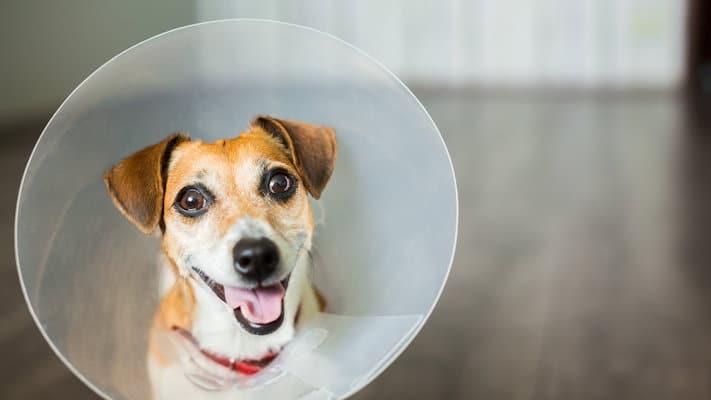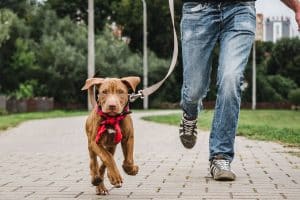Neutering is a big decision for owners to take and ultimately it’s for the greater good. However, neutering is a serious bit of surgery and has a required rest time afterwards which really does mean your dog is housebound.
For some outdoor loving pooches, this can be a total nightmare – they’re already feeling sorry for themselves and now they can’t even take part in their favourite pastime – walkies.
Our Jug Jeff has been neutered so we often get asked how soon after the snip he was back in the parks again and we’re happy to share his recovery time and general guidelines around waking the dog shortly after neutering.
You should ideally let your dogs rest for up to 48 hours since neutering surgery and post-op. The doggo can begin light exercises and games in the backyard until the 3-day check-up and short leash walks until the 10-day check. After which, your dog is completely recovered for long walks.
Don’t rush into anything.
Before we start it’s important to remember that neutering is a serious bit of surgery for a dog with risks. Neutering is not only intrusive but a tiring process. After they’ve had the surgery and up from anaesthetic they will be groggy, probably lost their appetite and they’ll be wearing one of those silly Elizabethan collars.
They won’t be in the mood to go for a walk in all honesty and you shouldn’t rush it. If your dog isn’t asking to be walked or giving you the signs after the operation then leaves the harness alone and let them rest.
First 24-48 hours
We recommend not taking your dogs out for walkies for at least 24-48 hours. There are a few reasons for this;
- The wound will still be fresh and susceptible to infections especially if it’s raining on the walk.
- The stitches may not yet have sewn the skin back together
- The anaesthetic may still be in the system making them clumsy
- Rigorous exercise or rough play with other dogs may tear the stitches apart
- The Elizabethan collar will make it uncomfortable
Obviously, your dog still needs some exercise and to go to the toilet so a quick and easy walk around the garden should be fine. If you don’t have a garden then a short walk around the block will do.
We recommend using a dog harness here as a collar is going to get annoying because of the Elizabethan collar.
Read More: Best Extendable Dog Leads to Buy in 2022
Day 3-5
If your mutt is making good progress then you can begin taking your dog on gentle walks, still on the lead but only in good weather. The wound (see also ‘DIY Comfy Alternative To The Cone Of Shame‘) is still easy to get infected and we want to avoid that at all costs.
We recommend keeping them on a short leash, a maximum of 15 walks and away from anything strenuous like other dogs who may invite them for a quick chase. Even if your dog is excellent when off the lead before the neutering we would still not really allow it because a tumble or rough play can still wreck the stitches – plus, they may still have the Elizabethan collar on at this point.
Day 5-10
At some point between Day 1 and Day 10, you will have had a post-neutering vet checkup to ensure everything is progressing as it should. To advise you on safely walking the dog after neutering we would go with the vet’s progress report. If they say all is well then you can be a little more relaxed on the walks after around day 5.
However, we would still personally refrain from off the lead walking and running but we would certainly be a bit more relaxed when it came to the length of the walk.
Day 10+
Your final vet checkup should give you the all-clear here! Woohoo! Unless you’ve not been keeping your dog clean and rested then after around 10 days your dog walks should be able to get back to normal which includes rough play and being off the lead!
No more Elizabethan collars, no more tied to the lead (if they normally wouldn’t)
How to speed up your dog’s comeback after the snip?
If you’re searching on Google for information on how quickly after a snip can you walk your dog again then we’re guessing you want it to happen sooner rather than later. Here are some tips on speeding up the process
- Let your dog rest in the first two days – this is a critical healing time, and rushing here can cause problems with the stitches.
- Allow your dog to tell you when they’re ready – don’t take them for a walk if they’re not asking for it.
- Keep the early walks away from anything that may distract them and make them want to run – aggressive dogs, cats, small animals they like to chase etc.
- Keep the pace light and the distance short.
- Instead of thinking about how soon can I walk my dog after neutering, think how quickly you can help them recover.
- Make sure they have access to fresh water 24/7 and their dog food provides complete nutrition.
- Have a comfortable harness and a good lead to keep them steady and comfortable while walking with the Elizabethan collar.
How do I stop my dog from jumping after neutering?
After your dog has undergone a neutering procedure, take the necessary steps to ensure a smooth and stress-free recovery period.
First and foremost, you must follow the post-surgical instructions provided by your vet. These instructions will vary depending on the type of surgery, so ensure that you understand what activities are acceptable. In general, you should avoid any running, jumping, playing, swimming, or strenuous activities for at least 14 days.
To keep your dog from jumping and running around after surgery, you may need to confine them or supervise them closely. When you’re not home, you can use their crate, exercise pen, or baby gates or confine them to one room. If you’re at home, consider using a leash to keep them close by.
After the first few days, many dogs start to feel better and get antsy. This can be the hardest part of the recovery process, but there are plenty of ways to keep your dog entertained and calm.
Give them stuffed toys like Kongs or other food toys to keep them mentally stimulated. You can also interactive puzzles and games with your doggo and teach them a few new tricks. Lastly, you can try giving your dog a massage, which can be extremely relaxing for them.
What to avoid after neutering a dog?
Here’s a guide for dog owners in the UK on what to avoid after neutering a dog
- Avoid strenuous activity: Avoid activities such as jumping, running, and rough play, for at least two weeks. This allows the incision site to heal properly and reduces the risk of complications. Your veterinarian may provide specific guidelines on when and how much activity is appropriate.
- Avoid letting your dog interact with the incision: Dogs are naturally curious and may try to lick or bite. To reduce the risk of infection and promote healing, keeping the incision site protected is important.
- Avoid exposing the incision site to dirt and debris: For similar reasons, the incision site should be kept clean and dry to reduce the risk of infection.
- Avoid sudden changes to your dog’s diet: It can upset their digestive system and cause vomiting, diarrhoea, or other digestive issues. It’s best to stick to your dog’s normal diet for a few days after the procedure.
- Avoid letting them interact with other animals without the vet’s approval: Dogs can carry bacteria and viruses that can harm a recovering dog. It’s best to keep your dog isolated from other dogs for at least two weeks after the procedure or until your veterinarian gives the okay.
- Avoid giving your dog non-steroidal anti-inflammatory drugs (NSAIDs): Medicines such as ibuprofen can have adverse effects on a dog’s digestive and cardiovascular systems, especially after a surgical procedure like neutering.
How much does it cost to neuter a dog in the UK?
The cost of neutering a dog in the UK can vary based on location, dog size, and procedure type. On average, the cost of neutering a male dog is between £70 to £150, while the cost of spaying a female dog is between £100 to £250.
However, these prices can vary greatly depending on the factors and your veterinarian. It’s best to contact a local veterinarian to get a more accurate estimate for your specific situation.
Can neutering change my dog’s behaviour?
Neutering a dog can have an impact on its behaviour. It may reduce or eliminate certain hormone-driven behaviours, such as marking, roaming, and aggression. In some cases, neutering can also reduce fear and anxiety.
However, it’s important to note that neutering does not guarantee a change in behaviour. In some cases, neutering can also have unintended effects on a dog’s behaviour, such as weight gain, decreased activity level, or changes in aggression or personality.
Don’t forget that neutering isn’t a quick fix for behavioural issues. Other measures, such as training and behaviour modification, may be necessary to address specific behavioural problems. If you have concerns about your dog’s behaviour, it’s best to consult a veterinarian or a professional dog behaviourist for personalized advice.



